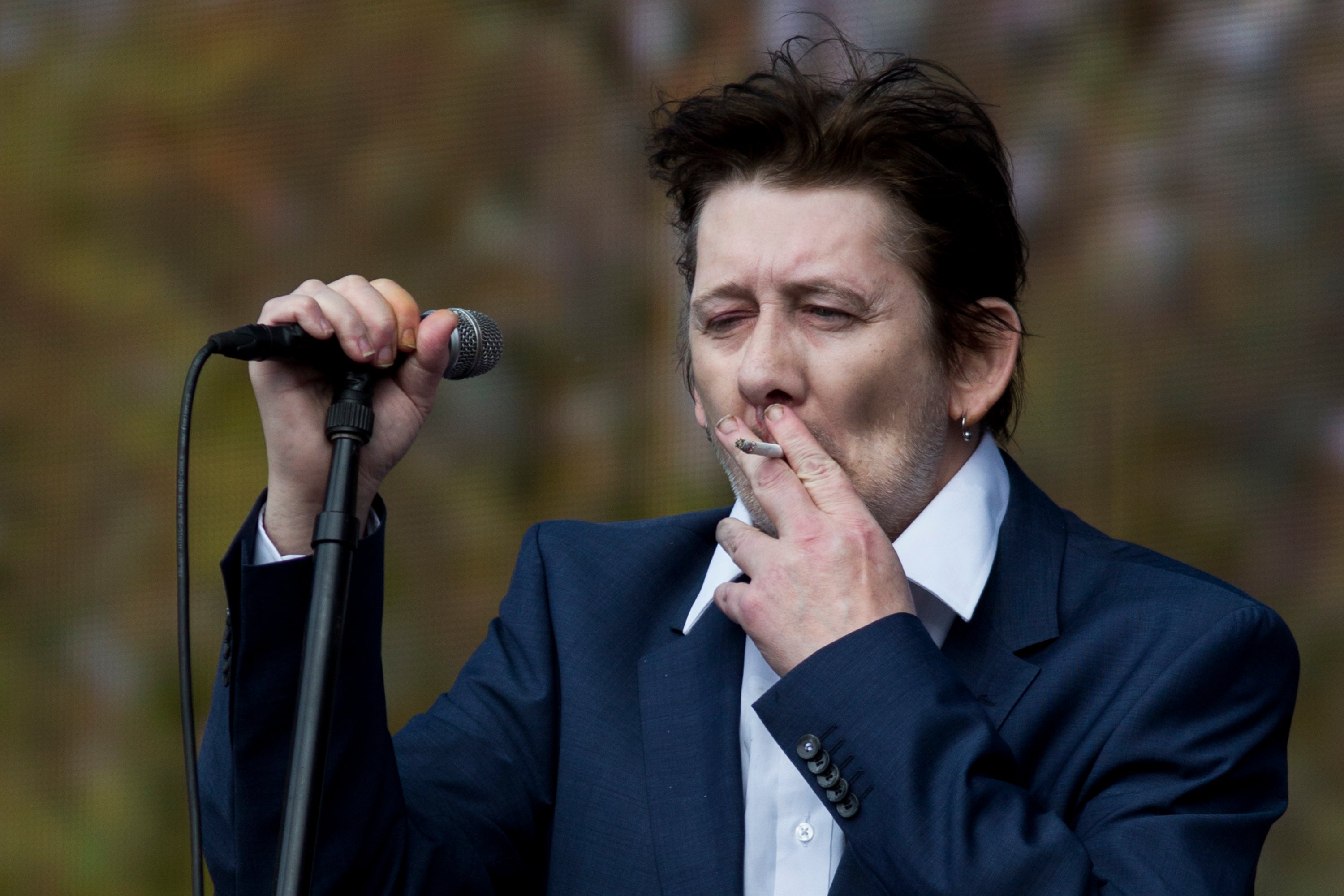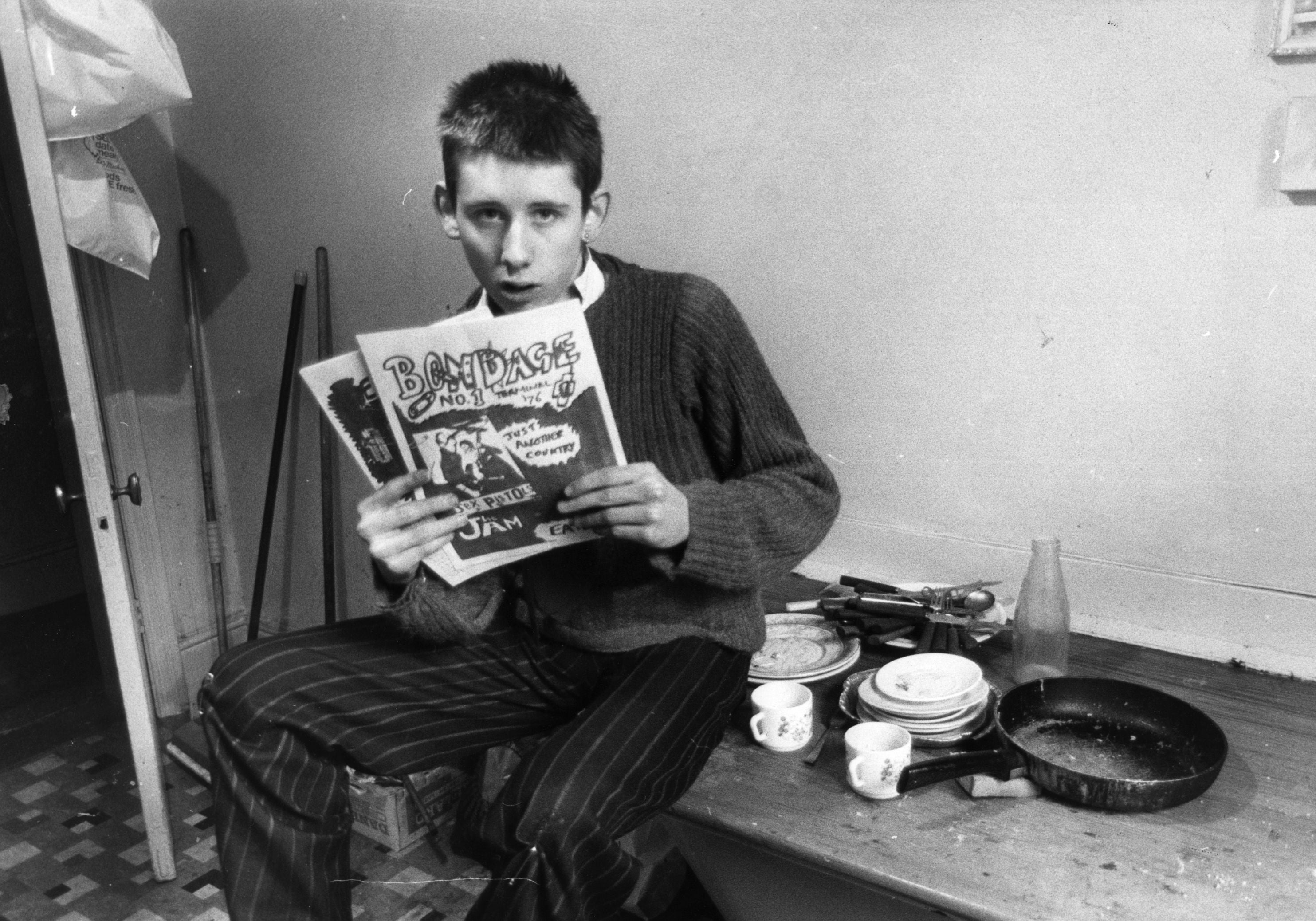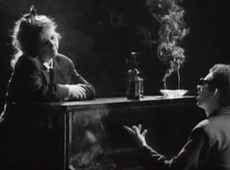The Independent's journalism is supported by our readers. When you purchase through links on our site, we may earn commission.
Shane MacGowan: ‘If there’s someone who wants a lot more of life, it’s me’
Sinead O’Connor expressed doubts about MacGowan’s will to go on, but he tells Mark Yarm that he’s far from finished

Your support helps us to tell the story
From reproductive rights to climate change to Big Tech, The Independent is on the ground when the story is developing. Whether it's investigating the financials of Elon Musk's pro-Trump PAC or producing our latest documentary, 'The A Word', which shines a light on the American women fighting for reproductive rights, we know how important it is to parse out the facts from the messaging.
At such a critical moment in US history, we need reporters on the ground. Your donation allows us to keep sending journalists to speak to both sides of the story.
The Independent is trusted by Americans across the entire political spectrum. And unlike many other quality news outlets, we choose not to lock Americans out of our reporting and analysis with paywalls. We believe quality journalism should be available to everyone, paid for by those who can afford it.
Your support makes all the difference.While promoting his 2020 documentary Crock of Gold: A Few Rounds With Shane MacGowan, British director Julien Temple frequently spoke of the many difficulties his subject presented during filming, as MacGowan – the famously hard-drinking and irascible former frontman of the Anglo-Irish folk-punk band the Pogues – engaged in conversation with, among others, actor Johnny Depp and former Sinn Fein president Gerry Adams.
During the making of the film, MacGowan sometimes wouldn’t show up where he was supposed to, and when he did, it could take hours to get a few minutes of usable material from the uncooperative musician. “He made it as though you were setting up cameras in the Siberian night,” Temple recalled in a recent interview, “and hoping that after a couple of months the snow leopard might trigger the camera.”
In early December, that metaphorical big cat found himself facing a laptop webcam, talking to a trepidatious journalist. It marked the first time that MacGowan had used video-conferencing software. “I’m very old-fashioned in a lot of ways,” said the singer, who was born in England to Irish parents and turned 64 on Christmas Day. He was streaming from the Dublin flat he shares with his wife, Irish writer and artist Victoria Mary Clarke.
MacGowan was tolerating this newfangled technology to discuss his upcoming book of never-before-seen artwork, handwritten lyrics and school essays, titled The Eternal Buzz and the Crock of Gold. MacGowan and Clarke, 55, are releasing the sizeable collection in partnership with Infinitum Nihil, the production company of their longtime friend Depp. (The couple are vocal supporters of the actor, who in 2020 lost a libel case against The Sun over its claims that he assaulted his ex-wife Amber Heard. Depp has denied the allegations.)
MacGowan said he did the drawings included in the book “to amuse myself,” describing them as “cartoons”. He was sitting on a green sofa chair, with a big black throw pillow in front of him, which he used to prop up a small pile of his work that Clarke had put together. His wife positioned herself over his left shoulder, smiling at MacGowan’s jokes and helping to facilitate the conversation.
Over the course of the hour-long video call, MacGowan’s speech and movements were slowed, and his trademark guttural laugh was muted. Since falling and breaking his pelvis in 2015, MacGowan has used a wheelchair to get around. He’s been in and out of hospital to treat a variety of medical issues, including a broken knee, the result of another fall in February. (He is undergoing physical therapy.) “You find out your bones are turned to dust,” MacGowan said, employing a profanity.
At one point during the interview, the singer held up his drawing of a cyan one-eyed monster with horns, a snakelike tongue and an exposed penis
It would appear a lifetime of hard living has led to the singer’s physical decline. “When I met him, he was very much a hell-raiser, who would drink everything that was in front of him, take any drug you could think of and always step out in front of cars,” Clarke, who began an on-and-off again relationship with MacGowan when she was 20, said in a separate interview. “I think he just thought he was indestructible. This is the first time that he’s ever had to face the possibility that he isn’t superhuman.”
Questions about how long MacGowan has for this earth have trailed him for much of his adult life. “Quite soon after I met him, somebody said to me, ‘You realise he’s only got about six months to live,’” Clarke recalled. More recently, Sinead O’Connor – a longtime friend and one-time musical collaborator of MacGowan’s – expressed doubts about his will to go on in a new authorised biography, A Furious Devotion: The Life of Shane MacGowan by British journalist Richard Balls, citing what she alleged was MacGowan’s continued substance abuse.
MacGowan, who said he had not read the book (“I don’t do much reading anymore, and I’m certainly not going to read about myself”), took issue with O’Connor’s assessment. “Well, she’s dead wrong,” he said. “If there’s someone who wants a lot more of life, it’s me.”
Enjoy unlimited access to 100 million ad-free songs and podcasts with Amazon Music
Sign up now for a 4 month free trial (3 months for non-Prime members)
Enjoy unlimited access to 100 million ad-free songs and podcasts with Amazon Music
Sign up now for a 4 month free trial (3 months for non-Prime members)

When it come to MacGowan’s life, it’s sometimes hard to separate legend from truth. By all accounts a bright child, he began drinking bottles of stout around age five and spent time in a psychiatric ward as a teenager. MacGowan became a London punk scenester, achieving his first blush of fame in 1976, when the British music paper NME ran a photograph of him bleeding from his ear under the headline “Cannibalism at Clash Gig.” (A female companion apparently had bitten him.)
In 1982, he co-founded Pogue Mahone, later shortened to the Pogues, a band that fused traditional Irish folk music with British punk rock. He recorded five studio albums with the band, most notably Rum Sodomy & the Lash from 1985, produced by Elvis Costello, and If I Should Fall From Grace With God from 1988, which features the group’s best-known song, “Fairytale of New York.”
Although admirers hailed MacGowan as a punk poet and the voice of the Irish diaspora, his considerable talents and keen intellect were often overshadowed by his hard partying and erratic behaviour. While touring Japan in 1991, the Pogues – unwilling to put up with the singer any longer – fired MacGowan. The band dissolved in 1996, then reformed with MacGowan as frontman in 2001. The Pogues continued touring until 2014, when the group broke up again.

MacGowan has taken steps toward self-improvement in recent years. In 2015, he underwent surgery to get a new set of teeth (the last of his originals had fallen out by 2008), a process documented in a British TV special called Shane MacGowan: A Wreck Reborn. He’s still drinking – during the interview, he took a few sips from a big glass of gin and tonic – but not in the manner he used to. “Must be a couple of years since I’ve seen him drunk,” Clarke said. MacGowan no longer smokes cigarettes, but said he uses cannabis.
At one point during the interview the singer held up his drawing of a cyan one-eyed monster with horns, a snakelike tongue and an exposed penis. “This is how you end up – too many drugs,” he said, pointing at the picture. Asked if he related to the image, he replied, “No, I don’t.”
MacGowan has been drawing since he was a child, when he would get a new set of Faber-Castell coloured pencils every Christmas, said his sister, Siobhan, a journalist-turned-novelist. Siobhan, 58, recalled family car rides from England to Tipperary, Ireland, where they spent summers and school holidays. “We were both huddled under the same blanket, writing and drawing,” she said, “going into our own little cocoon.”
The book’s punky drawings – doodled on everything from hotel stationery to vomit bags – date to the 1980s; most of them were recovered about two years ago from a black trash bag stored in Clarke’s mother’s attic. The 504-page hardcover, limited to 1,000 copies, is available for pre-order now and due out in April. The least expensive version will cost you £1,000.

The book isn’t the only place where fans will be able to see MacGowan’s drawings. Recently, the Los Angeles luxury boutique Maxfield began selling cashmere items by the Swiss brand Frenckenberger that feature MacGowan’s artwork. (A blanket emblazoned with MacGowan’s drawing of a pair of leprechauns – creatures MacGowan claimed to have seen in his youth – retails for £8,950.) And the Dublin-based creative studio Algorithm is putting together a Shane MacGowan immersive art experience, akin to those dedicated to the work of Vincent van Gogh, with hopes that it will begin touring internationally during 2022.
In an interview, Waldemar Januszczak, the art critic for The Sunday Times who wrote the introduction to The Eternal Buzz, hailed the artwork’s “demented, wild, fascinating, scabrous kind of energy”. He said he most admired MacGowan’s Catholic and sexual imagery, noting the “constant fellatio” depicted in the book’s pages. “Shane’s stuff doesn’t hold back at all,” Januszczak said. “It’s right out there, full of his desires.”
The artwork that brought up MacGowan’s most vivid recollection was his drawing of the New York City skyline. He related an incident that took place at the Manhattan nightclub the Limelight in the mid-1980s that involved actor Matt Dillon (“a great guy,” he said) hitting on Pogues bassist Cait O’Riordan: “She was a big girl, and she ended up kicking him down the backstairs.”
Clarke pointed out that there was a punchline to the story. “Did he say something really stupid like, ‘Is that a definite ‘no’?’?” MacGowan responded.

Dillon went on to play a police officer in the music video for the Pogues’ “Fairytale of New York,” a duet between MacGowan and British singer-songwriter Kirsty MacColl, who died in a boating accident in 2000. The song is considered a Christmas classic in the UK, but it is not without controversy. In 2020, BBC Radio 1 announced it would play an edited version of the track that excised a gay slur and another pejorative.
MacGowan, when asked about the perennial brouhaha surrounding the song, dismissed it as “rubbish”. He has argued that the slur, sung by MacColl, was an authentic representation of what her character might say.
MacGowan hasn’t released a full studio album since The Crock of Gold in 1997, which he recorded with the band the Popes. However, the singer has been working on an LP intermittently since 2015 with the Irish indie band Cronin. “Once he’s in the studio, he’s all guns blazing,” said the band’s drummer, Mick Cronin, who added that MacGowan had last recorded with the group in May.
Mick Cronin and his brother, Johnny, the band’s singer, guitarist and keyboardist, said in a joint interview that they’d completed 20 tracks with MacGowan, including covers of everything from Doris Day to vintage punk rock. Seven of the songs are originals, featuring old, previously unused lyrics by MacGowan.
“It’s still punk, and it’s still Irish, and it still goes to the heart,” Johnny Cronin said of their collaborations. And what does the newer music sound like, according to MacGowan? “Pretty much like the old music,” the singer said.
It’s unclear when the comeback album might be released. MacGowan expressed the desire to get back into the studio to record more material. “But I can’t concentrate on that stuff,” he said, “when I can’t even walk across the room.”
This article originally appeared in The New York Times



Join our commenting forum
Join thought-provoking conversations, follow other Independent readers and see their replies
Comments